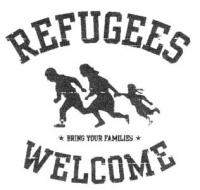The neoliberal restructuring of cities, happening in the last decades, has abstract reasons but concrete results. The face of the city is changing. Space is getting privatized and groups of people who do not fit into the image of the “clean” and “functional” city, which is able to attract a lot of tourists, are excluded and banished. The exclusion happens through “security controls”, special security zones and different forms of surveillance, which help to govern space and enforce the neoliberal vision of a desirable city. This city is created to match the purposes and requirements of capital and can be rather called a company than a place which offers the possibility of a decent life for everyone.
To make this “company” work, resp. to involve those in the mission of profit accumulation who have good reason to protest - because they are actually paying with their lives for a profit that is not theirs - other fields of conflict are pushed ahead.
“War on terrorism” and the national idea produce a dangerous 'other' who makes “everything” worse if joining the community.
In the setting of another capitalistic crisis “the roof over the head”, similar to ground in the countryside, is gradually (re-)appropriated by private property. Whole city quarters are “upgraded” to maximize the profit of real estate companies and the former inhabitants of the neighbourhoods are not welcome anymore, as they do not fit into the new image. The (expected) upgrading leads to higher rents and forces people to leave the neighbourhoods, in which they have lived for many years. This has the consequence that social structures are destroyed and the people who are forced to leave loose their social base and familiar surroundings.
The parting line of “in” or “out” in this image is less a question of origin than of money and economic value.
Worse is the situation of those who can’t even develop a social base and familiar surroundings because residence and access to job market are generally denied. The procedure of physical entrance into Europe is brutal and harsh on purpose to control “the mass” or/and the ones who tend to be an antagonistic power to the capitalistic system. Market-liberal, conservative and nationalistic powers go hand in hand to push their ideas and their will to dominate the public opinion.
Cities are nodal points of intersecting interests and therefore the heart of social conflicts. It’s important to analyze clearly the conflict lines named above, and from that to create a sphere of solidarity and solidary action – beyond charity and morality.
The right to the city is for EVERYBODY
If cities are structured and developed to suit only the ideas of certain privileged groups of society, always trying to achieve economical benefits, it is necessary to claim a different vision of a desirable city!
In opposition to processes of exclusion we have to claim “the right to the city” for everyone! The right to move freely, the right to access the city’s goods and infrastructure, and the right to actively participate. It means to create and develop the city in self-governance according to the needs of the people who actually live within the structure – no matter how long they live there and how much money they can bring in.
Cities can offer a great variety of options to make a living if these options weren’t artificially shortened. (Very visible in the management of abandoned houses and e.g. squatting ambitions.) It needs a fight for these options and self-made choices beyond state welfare and paternalistic “generosity”. It needs a new horizontal and local structure of collective organization, self-governed living spaces and meeting points that people try to keep free from any discrimination. It needs a shift of focus from capitalist effort to free productivity of being, acting and thinking. One central base of this will be a common access to the “project city” and a collective solidarity fight against displacement and exclusion.
Exclusion is an experience refugees make every day. People of Color are constantly threatened by racial profiling and identity checks, passport controls, institutional and informal racism – the insecurity of their body and live. Their right to move freely and stay wherever they want – their right to the city – is categorically denied by european and austrian law.
In the face of the actual refugee struggles in Vienna it becomes even more relevant and urgent to collectively claim and realize a right to the city for everyone!

